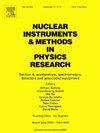CANDLES-III detector: Low-background spectrometer for studying neutrino-less double β decay of 48Ca
IF 1.5
3区 物理与天体物理
Q3 INSTRUMENTS & INSTRUMENTATION
Nuclear Instruments & Methods in Physics Research Section A-accelerators Spectrometers Detectors and Associated Equipment
Pub Date : 2024-10-20
DOI:10.1016/j.nima.2024.169982
引用次数: 0
Abstract
The CANDLES-III detector was installed at the Kamioka Observatory in Japan to investigate the double decay of 48Ca. This system combines an undoped calcium fluoride scintillator with a long attenuation length (larger than 100 cm), and a two-phase liquid scintillator, thereby serving as a larger-mass detector of 305 kg (contains 350 g of 48Ca) while maintaining a high energy resolution (% at -value of 48Ca double beta decay). Low-background conditions are achieved in the energy region of interest by improving the light yield and collection efficiency of the detector system, allowing to access a high energy resolution, as well as by installing passive and active radiation shielding, and using pulse-shape analysis. This paper describes the details of the detector including its site and data acquisition system and presents its performance characterization.
CANDLES-III 探测器:用于研究 48Ca 的无中微子双 β 衰变的低背景光谱仪
CANDLES-III 探测器安装在日本神冈天文台,用于研究 48Ca 的双β衰变。该系统结合了一个衰减长度较长(大于 100 厘米)的未掺杂氟化钙闪烁体和一个两相液体闪烁体,因此可作为一个 305 千克(含 350 克 48Ca)的较大质量探测器,同时保持较高的能量分辨率(48Ca 双β衰变 Q 值时,σ=2.6%)。通过提高探测器系统的光产率和收集效率,实现高能量分辨率,以及安装被动和主动辐射屏蔽和使用脉冲形状分析,从而在相关能量区域达到低背景条件。本文介绍了探测器的详细情况,包括其场地和数据采集系统,并介绍了其性能特征。
本文章由计算机程序翻译,如有差异,请以英文原文为准。
求助全文
约1分钟内获得全文
求助全文
来源期刊
CiteScore
3.20
自引率
21.40%
发文量
787
审稿时长
1 months
期刊介绍:
Section A of Nuclear Instruments and Methods in Physics Research publishes papers on design, manufacturing and performance of scientific instruments with an emphasis on large scale facilities. This includes the development of particle accelerators, ion sources, beam transport systems and target arrangements as well as the use of secondary phenomena such as synchrotron radiation and free electron lasers. It also includes all types of instrumentation for the detection and spectrometry of radiations from high energy processes and nuclear decays, as well as instrumentation for experiments at nuclear reactors. Specialized electronics for nuclear and other types of spectrometry as well as computerization of measurements and control systems in this area also find their place in the A section.
Theoretical as well as experimental papers are accepted.

 求助内容:
求助内容: 应助结果提醒方式:
应助结果提醒方式:


